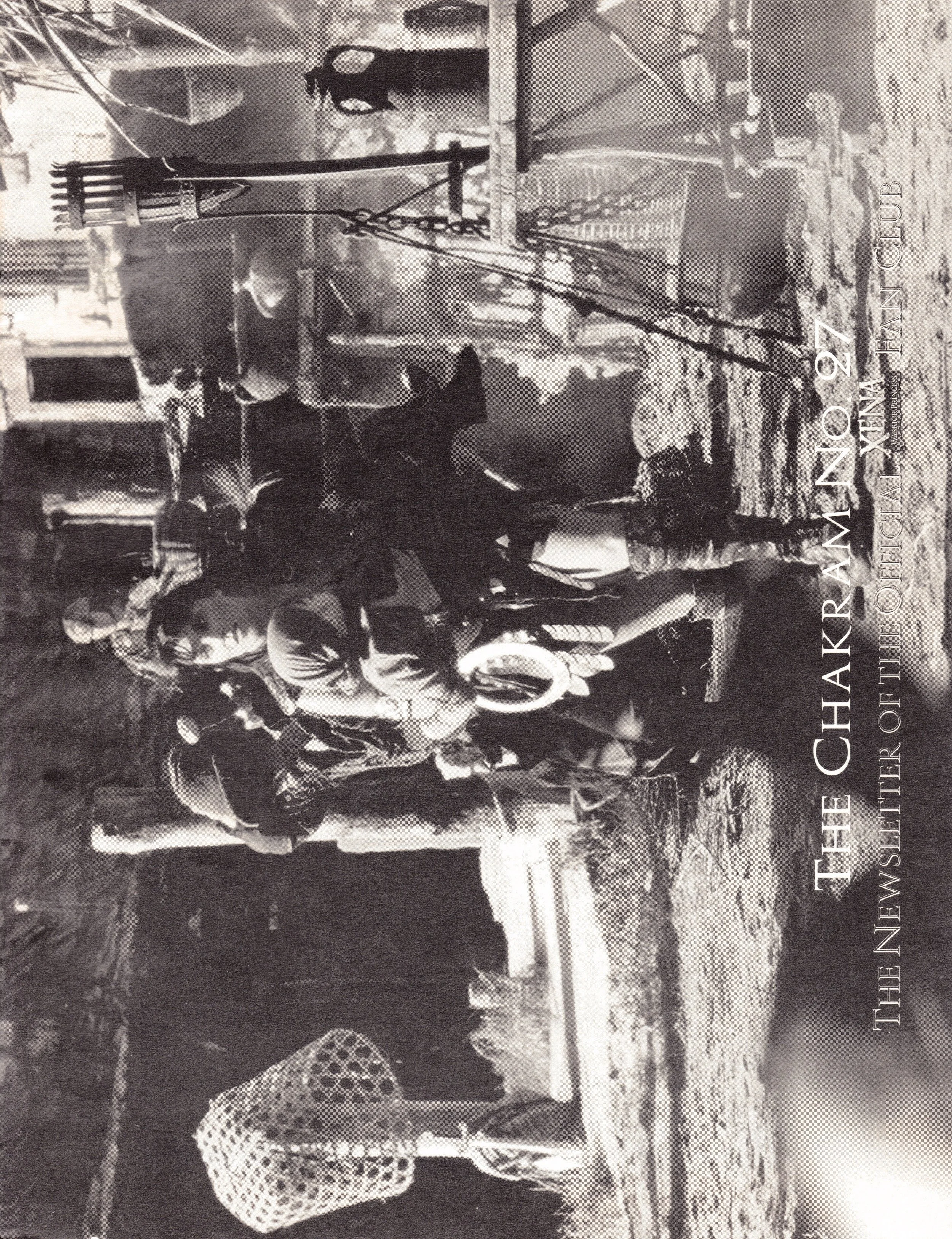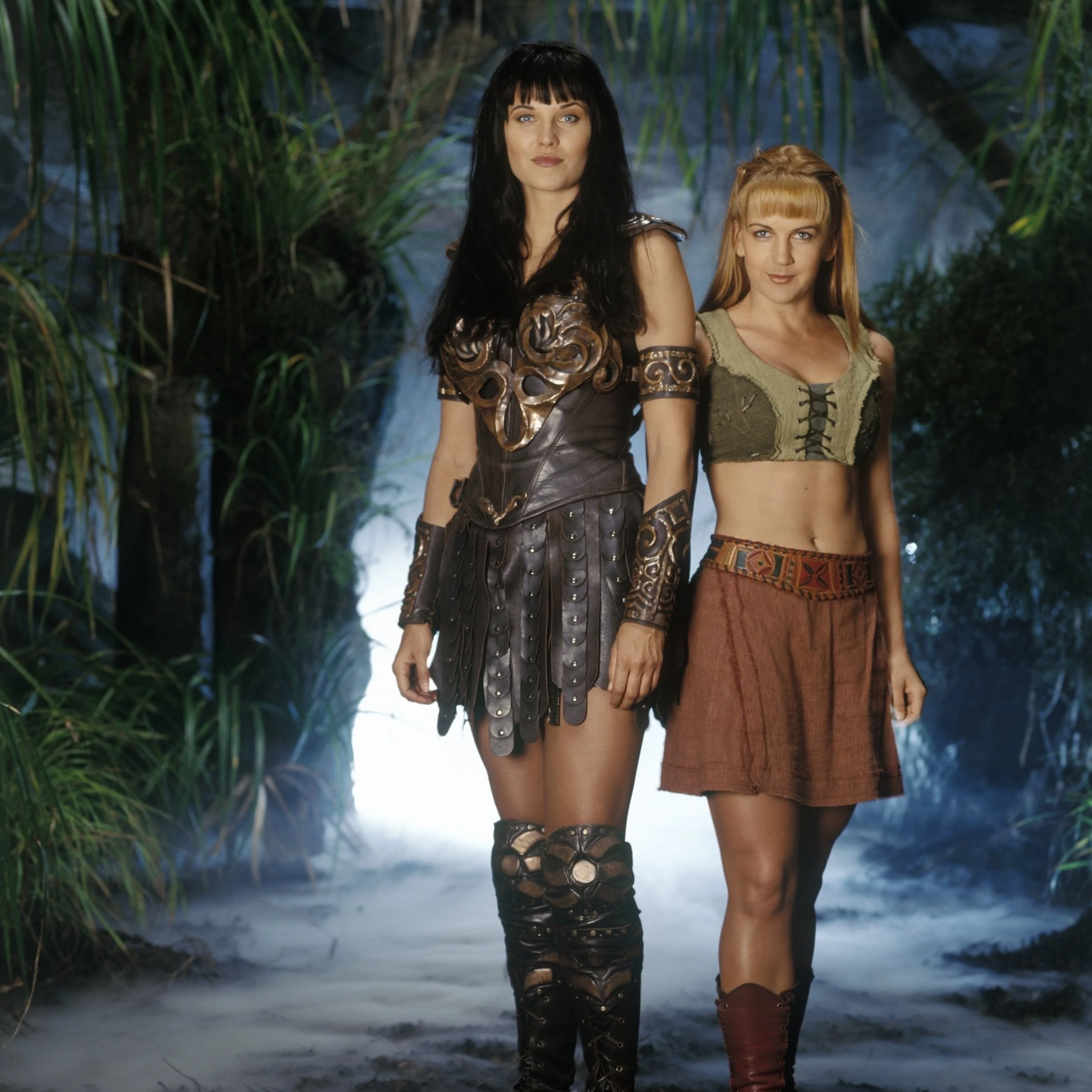The Execution
written by Paul Robert Coyle
The Chakram Newsletter: Issue 27
SD: What story did they want to tell and what elements were you given to use?
Paul: This is one of the stories that came out of my original pitch to write for the series. It was a very successful pitch. I pitched half a dozen and we ended up doing at least three!
SD: Was this the first freelance script you wrote for them?
Paul: No. The first actual assignment was the story that became “Ten Little Warlords.” It was a Gothic Agatha Christie-type story set on an island. That same day I pitched the story that became “The Execution” and also a story that became my first Hercules episode, “The End Of The Beginning.” That was originally meant for Xena. I had an incredibly successful meeting my first time out with Renaissance. And all three of my episodes that season were affected, to varying degrees, by Lucy's pelvic injury.
I'd already completed “Ten Warlords.” “The Execution” was the middle story. It ended up airing last even though I wrote “A Necessary Evil” third. They were flopped in shooting order because of Lucy’s injury. After her injury, the first show they shot was “Ten Little Warlords.” I was called back to rewrite the Callisto body-swapping situation.
SD: Did that involve just changing dialogue to reference who was in which body?
Paul: It was slightly more complicated than that, but not a lot more. That was a complete shooting script, ready to go, with Lucy playing Xena in the story as you saw it. I thought swapping the bodies would be a good idea when I heard what happened to Lucy and they'd had the same idea and had decided to alter the ending of “Intimate Stranger” which aired right before “Ten Warlords.”
Lucy’s accident happened during their hiatus. “Warlords” was the first show they shot after they came back and “Execution” was due to film shortly after that and it got pushed off to months later in the season. That story didn’t lend itself to a bodyswap situation. If “Execution” had been scheduled immediately after the hiatus, it might have involved using Hudson. But I think it worked out much better with “Warlords.” They did “The Quest” and “For Him The Bell Tolls,” and a bunch of shows that were Lucy-free or Lucy-lite in a row and gradually brought her back.
In “A Necessary Evil,” there’s a fight at the beginning and I actually wrote that Xena was injured so that if Lucy was limping, it would be part of the story. But it became unnecessary because by the time Lucy was back, she exhibited no signs of the injury.
SD: Back to the idea behind “The Execution.”
Paul: It was originally a story about Xena coming to a small town where an infamous warlord is due to be hanged in the morning. He sends for her and calls her into his cell and says, “You and I both know that my past was due to catch up with me at some point. The irony is, that of all the crimes I committed, the one that I’ve been tried and sentenced to death for, is the one I'm innocent of. I didn’t do it - you did!” She realizes that’s true. He makes a deal that she will break him out of prison so he can accomplish one last decent thing in his life - to turn his daughter who’s started to follow in his violent footsteps back onto the path of good.
That last bit, which was dropped from “Execution,” I later turned into a Hercules episode called “Bedeviled,” which involved a character who’d gone to hell coming back - and that character was meant to be Callisto coming back to reform her sister who, it turns out, hadn’t died in the fire at Cirra after all and was now following in Callisto’s violent footsteps. In the end, I had to change it from Callisto to an original character played by Jeremy Roberts, because Rob decided to bring Callisto back on the season premier of Xena that very same night.
What they did was bring the character of Meleager into my “Execution’ pitch. When they called me back they said, okay, instead of the warlord, we want to use this Tim Thomerson character, Meleager, who they had used in season one in “The Prodigal,’ liked a lot and wanted to bring back. They were intrigued by the fact that Xena was guilty of countless crimes against humanity for which she could, theoretically, be brought to justice someday. They hadn’t thought about that yet. She could be caught, put on trial and sentenced. They dealt with that more head-on the next year in the episode “Locked Up And Tied Down” (AKA “Shark Island Prison”).
They gave me a tape of “Prodigal” to look at and the script. Meleager was obviously based on the Lee Marvin character in Cat Ballou. But they didn't want to bring him back as a drunkard. Although his secret is that he’d fallen off the wagon and gone back to his drunken ways, but he was too ashamed to tell Gabrielle.
I thought this was a poignant situation for Gabrielle. She has this hero who has now slipped from the pedestal she put him on and comes to realize that if it happened with Meleager might it happen someday with Xena? Some fans have seen the seeds of the Rift between Xena and Gabrielle in this episode. If that's true, it was unintentional on my part. And I don’t know that the writing staff had that in mind at this point although they may have had some long-term projections for a rift happening to the characters.
I do remember talk in the room that this would be the first time Gabrielle would openly defy Xena. They would really be on different sides of the same issue with Xena suspecting Meleager might be guilty or at least lying and Gabrielle totally unable to accept that fact. They were attracted to that premise and we played it up in the first act break where Gabrielle literally stands with her staff against Xena and says, “You'll have to go through me to get to him!”
SD: What was the relationship between Meleager and Gabrielle for you?
Paul: Obviously, surrogate father and daughter. I talked about that in the scene where Meleager’s having her write out his last will and testament. Originally, if you'd asked me what the theme was, I would have said Meleager is Gabrielle’s childhood hero and the theme is of tarnished heroes. But having viewed “The Prodigal,” I realize Gabrielle didn’t know him before that episode. She’d only heard of him. But he’d helped save her village and she helped reform him. He’d come to think of her as the daughter he never had.
SD: You have Gabrielle defending Meleager in the trial without even knowing what he’s accused of!
Paul (laughing): Simply because she believes he’s a good man and can’t believe he’s guilty of anything they could be accusing him of. I played it a bit for comedy in the beginning before Gabrielle realizes the seriousness of the charges. I guess Meleager had sent her the ancient equivalent of a telegram, but he didn’t lay out the details. (laughing)
SD: Gabrielle has been with Xena long enough to know Xena has a pretty good sense with bad guys, but Gabrielle won’t consider that Xena might be right about Meleager.
Paul: It made for good drama to put them into conflict. Had the situation been in reverse and Xena been in trouble for a crime supposedly in the present - not something from her past life - Gabrielle would have been just as dead certain that Xena was innocent.
SD: So it wasn't a case of Gabrielle not trusting Xena’s judgment, she was fixated on defending her friend?
Paul: Absolutely. Gabrielle shouldn’t be a slave to Xena’s judgment. She was a strong-minded individual in her own right, with a great big heart and she would follow her own beliefs before she gave consideration to what Xena might think about a situation.
SD: And the naivete of youth. I'm jumping ahead, but the look on Gabrielle's face was tortured when Meleager admits he was drunk and doesn’t know if he killed the man or not.
Paul: I chose to play that as a look rather than going into a big discourse from Gabrielle at that point. I played that silent as well as the subsequent scenes where she won’t speak to Meleager and when Gabrielle is brushing Argo and Xena tells her, “Your friend needs a friend now more than ever.” When they finally reconcile at the campfire, I played that silent also. I chose to pull back before they start speaking to give them privacy, so to speak.
SD: Gabrielle looked absolutely betrayed.
Paul: She was betrayed, hurt. Here's someone she believed in. Of course, he thought he was guilty and it turns out he wasn't after all. (laughing) Gabrielle really was right about him.
SD: You have Xena playing the stern parent with Gabrielle - not listening to her arguments.
Paul: Well, Xena’s senses are correct in that Meleager is lying. He's not telling them the whole truth. Right from the start, Xena senses that. So I don’t feel she should believe Gabrielle knowing that the full truth of the situation hasn’t come out.
SD: How did Xena see Gabrielle at that point in time?
Paul: That Gabrielle was an innocent, good-hearted youngster who hadn’t been exposed to the evils of the world. She doesn’t understand that people have feet of clay. And a parent or mentor would want to educate a child about the realities of the world. It makes sense that Xena would not see Meleager through the same innocent eyes through which Gabrielle sees him. Xena was much more experienced and cynical.
SD: Xena knew Meleager was a warrior.
Paul: With blood on his hands.
SD: Did you write Xena catches an arrow in her teeth or was that done on the day? (laughing)
Paul (laughing): No, I think that was added by the stunt people or the director or Lucy on set that day. I thought it looked terrific! It was written that Xena catches a third arrow, but I didn’t specify how she caught it. (laughing)
SD: The “Argo chat” between Xena and Gabrielle - Xena says, “You put people on a pedestal, sooner or later they’re going to fall and your expectations fall with them.”
Paul: I’m glad that little exchange is still remembered.
SD: Gabrielle replies, “I put people on a pedestal?” Is Xena talking about Gabrielle putting her on a pedestal? Because, the way Renee delivered the line, some thought she was saying that Xena puts her on a pedestal.
Paul: No, Xena recognizes that, in her innocence, Gabrielle sees her (Xena) mostly from all the good they’ve done while traveling together - that while she’s aware of Xena’s past sins, she never really experienced them first-hand. Later she’ll see that side of Xena in “The Price.” But, for now, she idolizes Xena, sees her through rose-colored glasses. As she does with Meleager. As for Xena herself, she’s too much a realist to put anyone on pedestals, Gabrielle included.
SD: Gabrielle was furious with Xena for not listening to her.
Paul: I was told to play up the conflict. Friends who love each other have differences of opinion and there are always issues under the surface that come into play. Even when Gabrielle physically stands up to Xena, I’m sure she doesn’t expect she’s going to be able to fight her to a standstill. (laughing) I defused that situation by having Xena flip over her head.
SD: You could have had Xena just brush her aside.
Paul: It seems to me that would have been out of character for Xena. At the point where Xena rescues Gabrielle from the mob, she vaults into the circle and pulls her sword, but I remember specifically being told, “Make it clear she only pulls her sword as a threat. She has no intention of using it against unarmed, innocent villagers.” She would only use a sword against someone using one against her. So, when Gabrielle is standing there with her staff, what possible harm can she do to Xena? We know she’s not going to harm Xena. I’m not sure what Gabrielle was intending to do. The real question is what will Xena do to Gabrielle? Having Xena flip over her was the only out. She isn’t going to fight her.
This story was their emotional conflict. It was never intended to be that they would come to blows. (laughing) Even Meleager was not a worthy foe for Xena. When I described their fight, I said he wasn’t a threat to her. She doesn’t intend to do him harm, but she gave her word she would bring him back. And she’s ethically compelled to do that.
SD: The knitting woman? (laughing)
Paul: I think either R.J. or Steve (Sears) had the woman knitting as a nod to Madame Defarge in A Tale of Two Cities. The character existed in my draft as the witness who Arbus calls over to explain to Xena that she’d seen Meleager stumbling out of the barn with the bloody murder weapon in his hand. I also had a bunch of characters at the hanging to show that it was a carnival atmosphere. There was a guy hawking souvenirs. They gave some of that later dialogue to a woman who was later called as a witness which struck me as odd. She was so anxious to see this guy hang, yet at the same time she was supposed to have been sincere and objective in her testimony against him. (laughing) It seemed a little odd to make her the same character who was so bloodthirsty! (laughing)
SD: The budget strikes again! (laughing)


